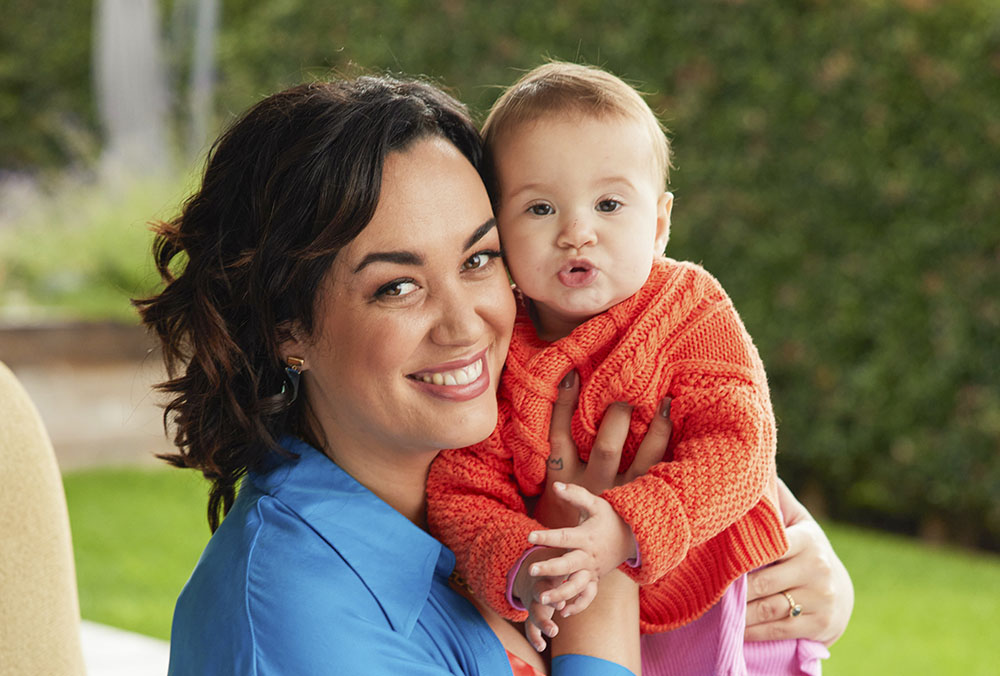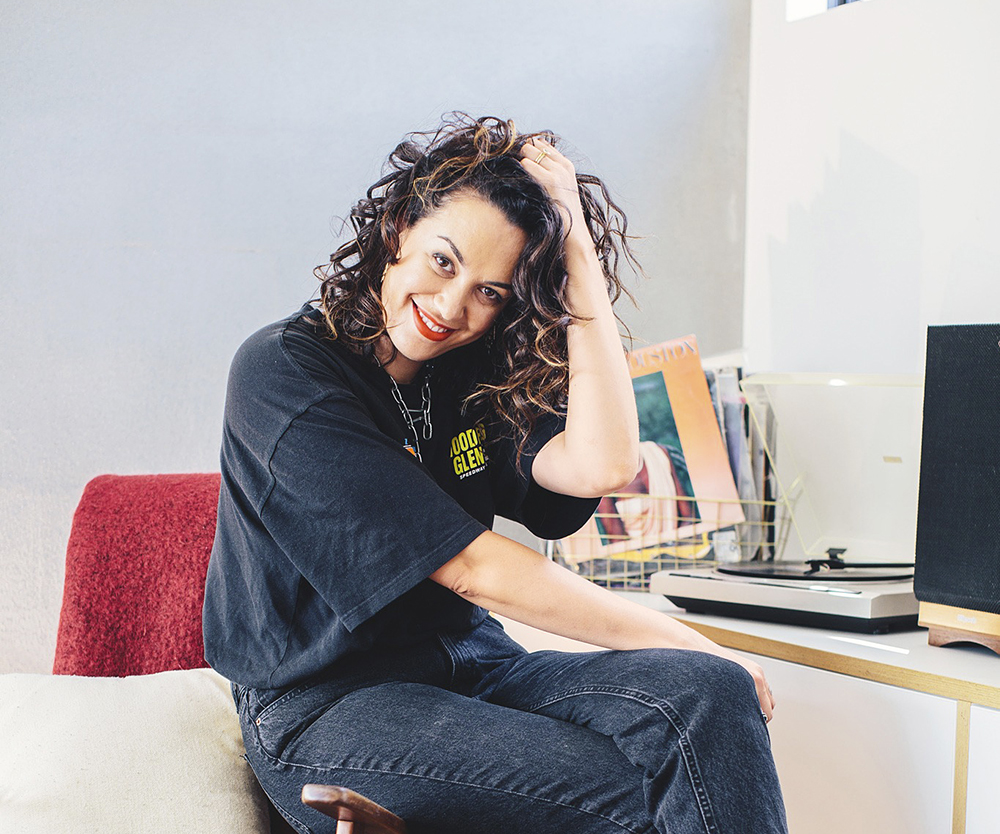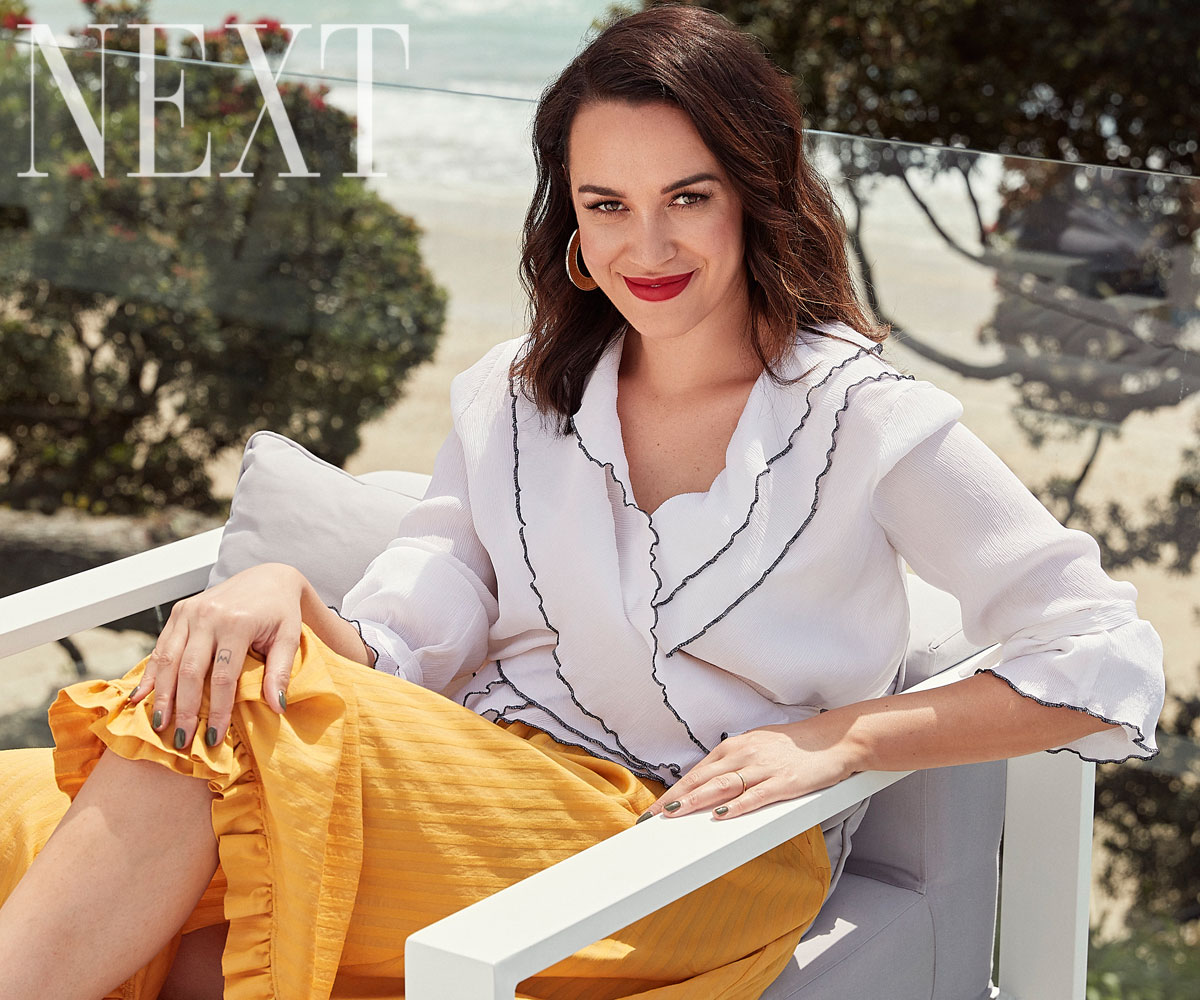Broadcaster Kanoa Lloyd finished filming her new show Sort Your Life Out NZ a few weeks ago. If she’s looking relaxed, it may be because the show helped her sort her own life out.
It needed some sorting: in the past 12 months, Kanoa gave birth to her now 10-month-old daughter Nikau Iris, coped with being a new parent during Covid lockdowns, returned to work on The Project and filmed her new show.
“It feels sort of small and familiar and friendly when you see the show on screen,” says Kanoa, “but it was very big and very fast. It was a real roller-coaster ride.”
Kanoa, 35, filmed the series four days a week while also working at Three’s popular 7pm news programme The Project two nights a week.

Kanoa’s thrilled to be back on The Project with Jeremy and Jesse Mulligan
“Like any new parent, you just do what you have to do to get through it,” she says. “It wasn’t until later that I realised it was quite hectic and hard not seeing my baby in the morning or the night some days.”
The premise of Sort Your Life Out NZ is to take stressed out families and change them one household at a time. The first series features eight families who let the TV crew lay the entire contents of their home out in a warehouse, then Kanoa, organisational expert Natalie Jane and carpenter Sean Brown help them shed some of their belongings, and return to a home which works much better for them.
Kanoa says she learned a lot about her own home and how it is organised. “Our stuff is representative of our headspace and very often our spaces aren’t working for us,” admits Kanoa. “We’re not finding flow and that can lead to anxiety and stress.”
Kanoa confesses the morning of our interview has been very stressful for her.
“Everything has just gone wrong,” she tells. “The baby has a funny tummy, and I find myself trekking back and forth, trying to find things I need and I think when you’re living under clutter, that’s what it’s like every day. How on earth do you cope when you’re dealing with anxiety? Where do you start?”

With her clutter-buster teammates Sean and Natalie
In Kanoa’s home, she confides, there is a cupboard which is a point of contention between her and husband Mikee Carpinter.
“It works very hard that cupboard. I’ve got pottery things in there, I save wrapping paper and ribbons, and you’ve got to have somewhere to keep all your blimmin’ reusable bags.
“Mikee likes to pull things out, wave them at me and say, ‘Do we still need this?'”
Which is exactly what Kanoa does with the Sort Your Life Out NZ families.
“We’d take all their stuff into the warehouse, lay it out, and I would literally wave things in their faces, saying, ‘Do you need this? Could you reduce this?’
I knew what we were trying to create for these people when they got back home, so I felt so confident and I had so much clarity, but they were having the same reaction I have when Mikee does it to me. They get very emotional.”

Kanoa has a chat to Sort Your Life Out NZ participant Charmaine, whose daughter Hetty (left) is fed up with her hoarding ways
Kanoa and Mikee are one of the group of parents who welcomed their newborn baby into a Covid environment. Nikau was born just two weeks before Auckland locked down for 100 days.
“It was our first baby, so we didn’t know any different, but there were some things about that time that were really lovely,” she tells.
Of their post-lockdown routine, Kanoa adds, “Most mornings, I get to be with Nikau before I go into The Project and we get to do cute things together or just hang at home. She is at peak cuteness right now, crawling, standing and chatting. She’s awesome.”
Mikee, a freelance editor and colourist, was able to work from home and was around for Nikau from the start. Konoa explains, “Mikee’s connection with his daughter is really special and he’s so hands-on. Nikau just loves him and trusts him implicitly.”
But Kanoa says looking back, it was hard for her not having a community around her and her new family.
“You get home from hospital and you feel like you’ve got your feet under you and maybe, just maybe, you could manage pushing your baby around a mall or go and get a cup of coffee and interact with people, and you can’t – so that was hard.”

‘When I had the Caesarean, I didn’t see it as a failure’
The couple also couldn’t see their families, although Kanoa’s mum, Diane Lloyd, did manage to come for a week.”Our brother and sister, who live in Auckland, could come and stand outside on the lawn and wave, but no one’s helping with the nappies, and the rest of our family and friends only got to meet Nikau on FaceTime.”
Nikau’s birth came after a long 30-hour labour which ended in an emergency Caesarean.
“That was okay because I didn’t really have a birth plan,” says Kanoa. “I decided not to try to control anything that was clearly out of my control. I didn’t want wind chimes or everything coloured purple and I’m really glad I didn’t because when I had the Caesarian, I didn’t see it as a failure. It wasn’t really shocking to us, it was just, ‘Okay, well this is what we have to do now. This is how she is going to get into the world.'”
And when Kanoa got Nikau home, she continued that philosophy.
“I wasn’t going to subscribe to one thing or another, or listen to what my neighbours are doing or my friend across the road.”
She acknowledges there have been difficult times with sleeping and breastfeeding.
“I figured out that when I was breastfeeding, if I watched those 1pm Covid updates, for about 24 hours afterwards I couldn’t breastfeed. So I stopped watching those.”
What worked best for Kanoa and Mikee was not being tied to concepts or constructs that other people have published or put online.
“We went through a bad sleep phase with Nikau for about two months, and I did go online to see what was normal, and thought, ‘Oh, we’re the opposite of normal – we’re weird.'”
In the end, they called a sleep consultant who said, “Yeah, everyone thinks they’re weird. Don’t read the internet.”

‘She is at peak cuteness right now. She’s awesome’
“That’s one thing we have always done with Nikau,” tells Kanoa. “If something is hard and what we’re trying isn’t working, we think, ‘Where can we go to get help?’, not let’s see what the internet is saying.”
The sleep consultant gave them a nutrition and a sleep plan, and the family worked their way out of the problem. “It was just the companionship and the reassurance from that person which was so valuable to us.”
As our first Matariki public holiday approaches on June 24, Kanoa has been thinking a lot about what it means to be the mother of a Māori girl.
“I want to be a role model for her, so it feels like it is a time to slow down and reflect on where we’ve been, and set intentions for where we’re going,” she asserts.
Kanoa is Ngāti Porou and says while she studied te reo at school and went to a kohanga reo for a while, her connection as an urban Māori to te ao Maori (the Māori world) has felt stronger at some times and then not so much at others.
“I’m really grateful for the times when it was stronger and I want to offer Nikau opportunities to connect with her whakapapa,” she says.
“I think that’s a parent’s job – to offer your kids opportunities to learn and to explore.”
Kanoa says it feels like connecting Nikau with her Māoritanga is an essential, “up there with eating, sleeping and reading”.
She adds, “Watching her and knowing ‘this is my Māori daughter’ is really healing and life-affirming for me. I can see that in her and she doesn’t even talk yet, so why do I have to question that for myself?
“I’m speaking as much Māori as I can to her, and she’s at that lovely stage where she understands what you’re saying and responds to it.
“She’s understanding Māori just as much as she’s understanding English and that’s really exciting to watch her little brain soak all of that up. It makes me really excited for what she might be interested in and capable of in the future.”
Meanwhile, Kanoa is back on The Project full-time and loving it.
“I’m happy to be home, to be honest. It really feels like I’ve come back home after being away on maternity leave and then all the lockdown stuff. We haven’t had live audiences or been able to have guests, so getting back in there and having all of those familiar things happening has been really lovely. It’s nice to have some of those creature comforts back, and really enjoy each other’s company and the job we’re doing again.”
And with Sort Your Life Out NZ starting soon, Kanoa can look back and remember her time working on the show with pride.
“It’s a career highlight for me because I was able to go in and be part of something where we’re actually creating change,” she enthuses.
“When you work in news, it can feel a bit like you’re just telling people stories, but with this show, I could actually get stuck in and leave families better off than when we found them.”


